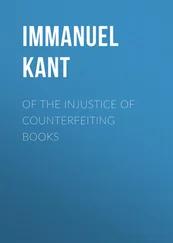47 The “I think” is, as has been already stated, an empirical proposition, and contains the proposition, “I exist.” But I cannot say, “Everything, which thinks, exists”; for in this case the property of thought would constitute all beings possessing it, necessary being. Hence my existence cannot be considered as an inference from the proposition, “I think,” as Descartes maintained — because in this case the major premiss, “Everything, which thinks, exists,” must precede — but the two propositions are identical. The proposition, “I think,” expresses an undetermined empirical intuition, that perception (proving consequently that sensation, which must belong to sensibility, lies at the foundation of this proposition); but it precedes experience, whose province it is to determine an object of perception by means of the categories in relation to time; and existence in this proposition is not a category, as it does not apply to an undetermined given object, but only to one of which we have a conception, and about which we wish to know whether it does or does not exist, out of, and apart from this conception. An undetermined perception signifies here merely something real that has been given, only, however, to thought in general — but not as a phenomenon, nor as a thing in itself (noumenon), but only as something that really exists, and is designated as such in the proposition, “I think.” For it must be remarked that, when I call the proposition, “I think,” an empirical proposition, I do not thereby mean that the Ego in the proposition is an empirical representation; on the contrary, it is purely intellectual, because it belongs to thought in general. But without some empirical representation, which presents to the mind material for thought, the mental act, “I think,” would not take place; and the empirical is only the condition of the application or employment of the pure intellectual faculty.
Chapter II. The Antinomy of Pure Reason.
Table of Contents
We showed in the introduction to this part of our work, that all transcendental illusion of pure reason arose from dialectical arguments, the schema of which logic gives us in its three formal species of syllogisms — just as the categories find their logical schema in the four functions of all judgements. The first kind of these sophistical arguments related to the unconditioned unity of the subjective conditions of all representations in general (of the subject or soul), in correspondence with the categorical syllogisms, the major of which, as the principle, enounces the relation of a predicate to a subject. The second kind of dialectical argument will therefore be concerned, following the analogy with hypothetical syllogisms, with the unconditioned unity of the objective conditions in the phenomenon; and, in this way, the theme of the third kind to be treated of in the following chapter will be the unconditioned unity of the objective conditions of the possibility of objects in general.
But it is worthy of remark that the transcendental paralogism produced in the mind only a one-third illusion, in regard to the idea of the subject of our thought; and the conceptions of reason gave no ground to maintain the contrary proposition. The advantage is completely on the side of Pneumatism; although this theory itself passes into naught, in the crucible of pure reason.
Very different is the case when we apply reason to the objective synthesis of phenomena. Here, certainly, reason establishes, with much plausibility, its principle of unconditioned unity; but it very soon falls into such contradictions that it is compelled, in relation to cosmology, to renounce its pretensions.
For here a new phenomenon of human reason meets us — a perfectly natural antithetic, which does not require to be sought for by subtle sophistry, but into which reason of itself unavoidably falls. It is thereby preserved, to be sure, from the slumber of a fancied conviction — which a merely one-sided illusion produces; but it is at the same time compelled, either, on the one hand, to abandon itself to a despairing scepticism, or, on the other, to assume a dogmatical confidence and obstinate persistence in certain assertions, without granting a fair hearing to the other side of the question. Either is the death of a sound philosophy, although the former might perhaps deserve the title of the euthanasia of pure reason.
Before entering this region of discord and confusion, which the conflict of the laws of pure reason (antinomy) produces, we shall present the reader with some considerations, in explanation and justification of the method we intend to follow in our treatment of this subject. I term all transcendental ideas, in so far as they relate to the absolute totality in the synthesis of phenomena, cosmical conceptions; partly on account of this unconditioned totality, on which the conception of the world-whole is based — a conception, which is itself an idea — partly because they relate solely to the synthesis of phenomena — the empirical synthesis; while, on the other hand, the absolute totality in the synthesis of the conditions of all possible things gives rise to an ideal of pure reason, which is quite distinct from the cosmical conception, although it stands in relation with it. Hence, as the paralogisms of pure reason laid the foundation for a dialectical psychology, the antinomy of pure reason will present us with the transcendental principles of a pretended pure (rational) cosmology — not, however, to declare it valid and to appropriate it, but — as the very term of a conflict of reason sufficiently indicates, to present it as an idea which cannot be reconciled with phenomena and experience.
Section I. System of Cosmological Ideas.
Table of Contents
That We may be able to enumerate with systematic precision these ideas according to a principle, we must remark, in the first place, that it is from the understanding alone that pure and transcendental conceptions take their origin; that the reason does not properly give birth to any conception, but only frees the conception of the understanding from the unavoidable limitation of a possible experience, and thus endeavours to raise it above the empirical, though it must still be in connection with it. This happens from the fact that, for a given conditioned, reason demands absolute totality on the side of the conditions (to which the understanding submits all phenomena), and thus makes of the category a transcendental idea. This it does that it may be able to give absolute completeness to the empirical synthesis, by continuing it to the unconditioned (which is not to be found in experience, but only in the idea). Reason requires this according to the principle: If the conditioned is given the whole of the conditions, and consequently the absolutely unconditioned, is also given, whereby alone the former was possible. First, then, the transcendental ideas are properly nothing but categories elevated to the unconditioned; and they may be arranged in a table according to the titles of the latter. But, secondly, all the categories are not available for this purpose, but only those in which the synthesis constitutes a series — of conditions subordinated to, not co-ordinated with, each other. Absolute totality is required of reason only in so far as concerns the ascending series of the conditions of a conditioned; not, consequently, when the question relates to the descending series of consequences, or to the aggregate of the co-ordinated conditions of these consequences. For, in relation to a given conditioned, conditions are presupposed and considered to be given along with it. On the other hand, as the consequences do not render possible their conditions, but rather presuppose them — in the consideration of the procession of consequences (or in the descent from the given condition to the conditioned), we may be quite unconcerned whether the series ceases or not; and their totality is not a necessary demand of reason.
Читать дальше












